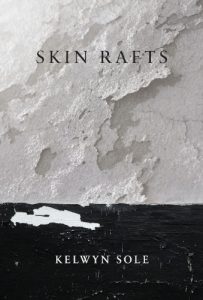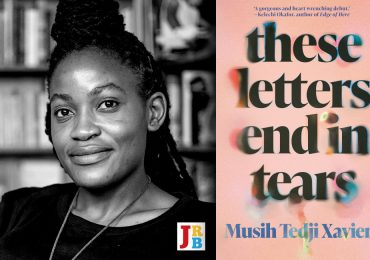Kyle Allan reviews Skin Rafts by Kelwyn Sole, a collection of poems that wrestle with a world that is connected to us and yet filled with alienation.

Skin Rafts
Kelwyn Sole
Hands-On Books, 2022
But I also say: I want to find
those words that can be lived in before
they lose me again
Even if I, like you, have come to forget
that the rocks and soil beneath us
have been secured with a foundation
of lies and rubbish
—‘Facebook (with timeline)’
Skin Rafts is a book of poems that foregrounds the awkward metaxy of being alive in a world of objects and existences connected to other things, while also isolated and alienated. A wakeful and questioning aesthetic attempts to hold the reader’s attention in a world slowly being drowned by a tide of inverted silence; the steady discordant hum of simultaneous oneness that is the heartbeat of the technocratic age. This, while existing within the particularities of the South African context: a conflict zone, where truth is contested and polarised. How does one truly listen, or become aware of reality, as a writer, in this space? How does one write?
where do we go,
when the words we choose
to live by are all we can see?
—‘Two oceans: the foreboding’
Furthermore, as I am writing this review, the latest version of the AI writing engine ChatGPT is generating acclaim and furore. Seemingly capable of producing undergraduate level essays, and reasonable poems in iambic metre, if requested, it has got me thinking, again—What does it mean to be human? To be alive, to exist, to be in the world through language? What is a human face, or even any face, in an increasingly faceless, or virtually faced world?
A face yes but
my country has a broken sky
though this is not yet noticed
—‘Facebook (with timeline)’
I feel these are also strands that run through this book; a collection of poems that muse upon and wrestle with the tangled and contested meanings of this local and intra-planetary entanglement we inhabit with our bodies, our words and silences. A world that is connected to us yet filled with alienation; with disjuncture but also with beauty.
Moon’s now
in decline:
her radiance has gone arthritic
and her reflection hobbles
gamely between walls,
along locked gates
parked cars
but stops
to commiserate
with every face –
—‘Five befuddled moons’
Sole’s poem ‘Facebook (with timeline)’, which was a co-winner of the 2019 New Coin Dalro Prize, explores eloquently the jarring disjunctures of contemporary life. The poem hints at the limitations of social media and mass media discourse, and contrasts the ambience of this kind of communication with the natural world (and its possibilities). It contains some captivating images:
Storms’ dark cloud-caterpillars
inch closer across the coastline
slowly nibble up the sun
yet somewhere in the nonsense
of my head remains a dream of
lightness.
Sole purposely does not mention social media by name, except in the title, but hints at it through reminders of things we are all too familiar with, from the virtual Gehennas we cohabit in:
But my gaze is too simple, too simple
to credit why so many dogs
pacing around each other
in this enclosed space
can whine and bark at the same time
These words capture the ‘animalisation’ of human society that internet culture evinces, as well as the enclosedness of social media, that digital prison camp of mass intellect and disembodied selves. The stanza also touches on the contradictory and even hypocritical tendency of those participants who cry victim and torment others at the same time. But the poem is not simply a critique of social media. It closes in on ‘the South African experience’ and the country’s sustaining myths, which stimulate a constant barrage of banal and sometimes aggressive discourse:
If we remain content
to become encased in fables of glory
of wounding and redemption
over and over again;
at what cost
Emerging
from the pedantry of the national earth
ejecting a spit of cliches like
a cornered cobra?
The poem reflects a world where vanity has become a virtue, where people have lost their sense of humanity as defined by relationships and become mere ego-containers in echo-chambers.
We all move in parallel, alone,
through a world where self-love’s poor
substitute for knowledge, and vaunting
tongues can never find community
‘Facebook (with timeline)’ manages to be both a critique of social media in general and of the local situation and its adjoining sense of alienation. Indeed, many of the poems in Sole’s collection may seem alien to those used to the individual-centred I-articulating writing that dominates much of contemporary poetry. But this, in combination with the jazz-influenced and often dislocated rhythm of the poems, serves to intensify an awareness of what it is to live in a social, political, economic and ecological world that does not obey culture or ideology, but exists in a state of contestation and incomprehension—albeit with moments of epiphany and beauty:
he can see through
no glass darkly;
though
above them both
light gapes its beak
from the nest of every star
3.
How far, or close, their places of desire
—‘People in glass houses’
Of course, the very act of poetic witnessing is disconcerting in a world dedicated to lucrative mass media discourse aimed at the lowest common denominator; aesthetic defamiliarisation may come across as deliberate obfuscation or overreaching artifice. A writer depicting things as they are becomes antagonistic and discomforting, purposely aiming at misdirection through language.
And they ask me:
why do you make poems to confuse us?
and I answer: I make poems simply
from those vocables which have fallen out
with their fellows
—‘Imaging’
As Skin Rafts indicates, there are no easy answers, and complexity cannot be ignored. Perhaps the richest condensation of images in the book occurs immediately after the above lines:
I raise hackles into words
a mirror for reflections
not yet come,
the darkened glimmer
of the psyche,
the chimaera of you
I clutch to make desire
more palpable, then
a sudden blazing of release
The poem, which reflects upon, among other things, identity, relationality and self, builds a fluent tension with its subject through powerful, almost magical imagery, which transcends any potential sense of self pity or insularity. Take, for example:
Spider poems hanging from your ceiling,
in that place your broom can’t sweep clean
that only come out at night to eat your flesh
in small, incremental bites—
Or this gripping image, which gestures both towards oppression and the possibilities beyond it:
even as a child in a house
under a sky of cages
The South African landscape that permeates this collection is an ideologically, physically, spiritually and culturally contested zone, mediated through an articulate, lyrical narrative that offers a wry, tenderly ironic perspective on a violent legacy, as well as contemporary inadequacies and human vanity. The natural landscape is a key part of this Gestalt. The dense, rocky landscape is emphasised, but so are elements of bush, grass, leaf, the movements and weights of light, the feeling and presence of sky, the motion of water—and these all serve to project a broad and apparently open minded, ecologically aware realism. These observations of the natural world serve as a frame for understanding the social world, or an allegory of lost opportunity:
crows take off into the wind
once more, my people do not use
this dawn for their awakening
—‘Landscoping’
Nor is truth an easily graspable entity; it is something that moves and is embodied like wind:
For a moment, the air
in imagination
stills, coagulates,
seems to
arrange the landscape into
mere surface
becomes a painting
until the wind again antiquates
to craquelure
Whatever truth
you thought was framed
right there in front of you
And it all blows away
The hollowness of social constructs and the lived hypocrisies of political rhetoric are explored in poems such as ‘The empty space we call Mandela’:
Disembodied not by death
but long before: dismayed, dismaying,
floating above our moral carnage:
a name everyone invokes,
a stance no one can credit
In London a poet launches
his self-promoting barque of ignorance
with incantations to your legacy;
in Durban a performing Fallist
castigating the privileges
of everyone except
her own
In contrast to the detached performativity of superficial gestures, the bare and vital matrix of living is shared in some of the most fluent lines, from ‘What needs to be said’:
Words are just skin;
The body is the beloved
Or the challenge issued to the weaponisation of cliches in socio-political discourse:
And always what kind are you?
Following this: Are you of our kind?
I can only reply … well kind of …
And that only after mulling it well over
[…]
Whatever the case, its time
to be honest
My kind is just kind
—‘Kind’
The strongest poems in Skin Rafts meld the ecological, personal and socio-political almost effortlessly; foregrounding their entanglement. Many of the poems require a careful and attuned reading: they speak through the alienation of our time, attempting to unfold a language that can capture complexity and critique, awkward pauses and alternative musicalities. They urge the reader towards other possibilities; to be unafraid of seeking truth through contrariness.
Long ago
I made the trip from thirst stricken life to water.
My feet are muddy.
But if you walk towards the river,
I will walk away.
—‘Imaging’
And to embrace the embodied and precarious texture of being alive:
Though it is perilous
to hear the sea sirening
if you cannot swim
I wish my life were out
there once more, bobbing
on its raft of skin
—‘Two oceans: the yearning’
Skin Rafts is a collation of the contested real. To a reader accustomed to certain current literary conventions some of the work may come across as jarring and eccentric; likewise, to those more familiar with poetry that directly critiques or embraces an issue, Sole work may come across as oblique or even distant. The poet evokes a disjointed, entangled landscape, a landscape that is an uncannily familiar face for us, because it is also the form of our face(s), a zone in which we live, through contradiction, delusion, hope, desire and uncertainty, in our skin rafts.
- Kyle Allan is a poet, writer, recording artist and events organiser from the KwaZulu-Natal Midlands. He is editor of the poetry journal New Coin and the author of two books of poems: House Without Walls (2016) and The Space Between Us (2018).





